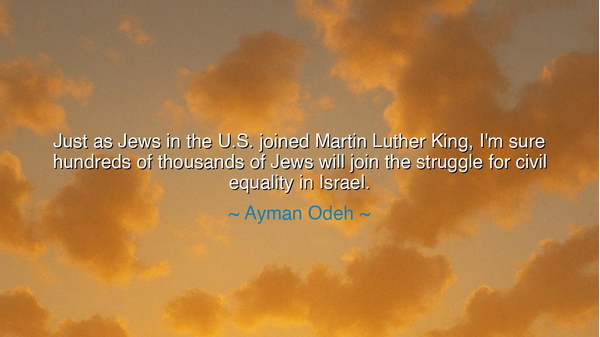
Just as Jews in the U.S. joined Martin Luther King, I'm sure
Just as Jews in the U.S. joined Martin Luther King, I'm sure hundreds of thousands of Jews will join the struggle for civil equality in Israel.






Ayman Odeh’s words carry the cadence of history’s echo: “Just as Jews in the U.S. joined Martin Luther King, I’m sure hundreds of thousands of Jews will join the struggle for civil equality in Israel.” In this saying, he summons memory not as a relic of the past, but as a torch to light the path of the present. He calls forth the vision of one struggle intertwined with another—the struggle of the oppressed for dignity, for justice, for the right to walk upright without chains upon their feet or shadows upon their names.
The meaning of his words lies first in remembrance. During the great march of civil rights in America, when Black men and women stood against segregation, humiliation, and violence, many of the Jewish people of the United States marched alongside them. They were not bound by shared ethnicity, but by shared humanity, recognizing that the cry of one oppressed people echoes in the soul of another. In the march from Selma to Montgomery, Jewish leaders walked with King. In the protests and in the pulpits, they raised their voices, proving that the call for justice transcends the walls of tribe and creed.
Odeh looks to this legacy as a promise for today. If in America, Jews saw in King’s struggle the mirror of their own history—of exile, of persecution, of ghettos and pogroms—then in Israel, he hopes, they will once again rise, this time to join their Palestinian neighbors in seeking civil equality. For the wound of inequality corrodes not only the oppressed, but the oppressor too, poisoning the land they share. Just as Jews in America once remembered their own slavery in Egypt and marched for the freedom of others, Odeh believes the same remembrance will stir hearts in Israel to walk with courage toward justice.
Consider the story of Rabbi Abraham Joshua Heschel, who marched beside King in Selma in 1965. When asked about his role, Heschel said, “I felt my legs were praying.” This simple phrase embodies the union of faith and action, the transformation of belief into movement. It was not enough to speak words of solidarity; he placed his body in the march, risking danger, because justice demanded more than sentiment. In his act we see the living truth of Odeh’s hope: that faith, identity, and history compel one not to remain silent, but to walk in the dust of justice’s road.
The struggle for equality in Israel is not a simple matter, nor can it be reduced to slogans. It is layered with fear, history, identity, and pain. Yet Odeh’s vision rises above division: it is a call for the universal principle that no human being should be master over another, that citizenship, dignity, and freedom must be the inheritance of all. He invokes history to remind his people that solidarity is possible, that it has been lived before, and that to deny it now would be to deny both memory and conscience.
From his words, a lesson emerges that spans all lands and all peoples: solidarity is the highest form of remembrance. To honor your own suffering is not enough—you must also honor the suffering of others. If your ancestors endured chains, you must oppose chains wherever they are found. If your people walked through exile, you must welcome the stranger. If your family once cried for justice, you must not close your ears when another family cries the same.
Therefore, let each who listens take this teaching to heart. Stand with those who are silenced, even if their struggle is not your own. Seek alliances not only among your kin, but among all who long for freedom. When injustice thrives in your city, your nation, your time, do not look away—join the march, lift the banner, and make your very steps into prayer. For as Odeh reminds us, the struggles of humanity are not separate rivers, but tributaries flowing into one great sea of justice.
Thus his words are both memory and prophecy. They remind us of what was done in America, when voices joined across boundaries to break the chains of segregation. And they prophesy what may yet come in Israel: that Jews and Palestinians, remembering the pain of history and the promise of equality, may one day march not as enemies but as companions, carrying together the torch of liberty. This is the civil equality for which humanity longs, and this is the legacy that Odeh calls us to fulfill.






AAdministratorAdministrator
Welcome, honored guests. Please leave a comment, we will respond soon